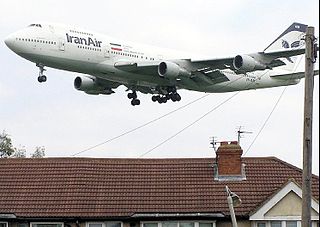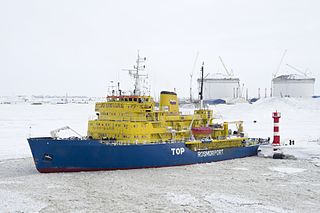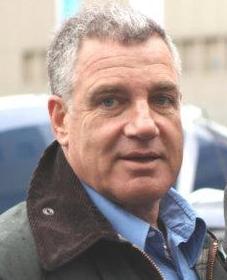
The Strait of Hormuz is a strait between the Persian Gulf and the Gulf of Oman. It provides the only sea passage from the Persian Gulf to the open ocean and is one of the world's most strategically important choke points. On the north coast lies Iran, and on the south coast lies the Musandam peninsula, shared by the United Arab Emirates and Musandam Governorate, an exclave of Oman. The strait is about 90 nautical miles (167 km) long, with a width varying from about 52 nmi (96 km) to 21 nmi (39 km).
Shipbroking is a financial service, which forms part of the global shipping industry. Shipbrokers are specialist intermediaries/negotiators between shipowners and charterers who use ships to transport cargo, or between buyers and sellers of vessels.

Zim Integrated Shipping Services Ltd., commonly known as ZIM, is a publicly held Israeli international cargo shipping company, and one of the top 20 global carriers. The company's headquarters are in Haifa, Israel; Originating in 1945, ZIM has traded on the New York Stock Exchange since 2021. From 1948 to 2004, it traded as ZIM Israel Navigation Company.

The relations between Iran and Israel can be divided into four major phases: the ambivalent period from 1947 to 1953, the friendly period during the era of the Pahlavi dynasty from 1953 to 1979, the worsening period following the Iranian Revolution from 1979 to 1990, and the ongoing period of open hostility since the end of the Gulf War in 1991. In 1947, Iran was among 13 countries that voted against the United Nations Partition Plan for the British Mandate of Palestine. Two years later, Iran also voted against Israel's admission to the United Nations.

The United States has since 1979 applied various economic, trade, scientific and military sanctions against Iran. United States economic sanctions are administered by the Office of Foreign Assets Control (OFAC), an agency of the United States Department of the Treasury. Currently, United States sanctions against Iran include an embargo on dealings with the country by the United States, and a ban on selling aircraft and repair parts to Iranian aviation companies.

The Ofer Brothers Group was an Israeli family shipping business started by the billionaire Ofer family which is today known as XT Group.
The National Iranian Tanker Company is a subsidiary of the National Iranian Oil Company, which was privatized in 2009. As of 2011, NITC was owned by funds managing pensions for 5 million Iranians. It is the biggest tanker company in the Middle East. The company transports Iranian crude oil to export markets and also engages in cross-trading of crude oil cargoes for some 150 oil majors worldwide, including Royal Dutch Shell, TotalEnergies, Saudi Aramco and state-run producers in Kuwait and Abu Dhabi. NITC has a capacity of 11 million tons per year.
There have been a number of sanctions against Iran imposed by a number of countries, especially the United States, and international entities. Iran was the most sanctioned country in the world until it was surpassed by Russia following its invasion of neighboring Ukraine in February 2022.

Iran is an energy superpower and the petroleum industry in Iran plays an important part in it. In 2004, Iran produced 5.1 percent of the world's total crude oil, which generated revenues of US$25 billion to US$30 billion and was the country's primary source of foreign currency. At 2006 levels of production, oil proceeds represented about 18.7% of gross domestic product (GDP). However, the importance of the hydrocarbon sector to Iran's economy has been far greater. The oil and gas industry has been the engine of economic growth, directly affecting public development projects, the government's annual budget, and most foreign exchange sources.

The Victoria Affair was a military operation conducted by the Israel Defense Forces (IDF) in March 2011 in which the Israeli Navy intercepted the vessel Victoria on the international waters in the Mediterranean, and discovered concealed weapons which, according to the IDF, were destined for Palestinian militant organizations in the Gaza Strip. The vessel was found to be carrying approximately 50 tons of weapons, including C-704 anti-ship missiles, rocket launchers, radar systems, mortar shells and rifle ammunition.

The Iran–Israel proxy conflict, also known as the Iran–Israel proxy war or Iran–Israel Cold War, is an ongoing proxy war between Iran and Israel. Supporters of Israel cite threats and hostility by Iran's leaders against Israel, and their declared objective to dissolve the Jewish state on the basis of, or not on the basis of anti-semitic rhetoric and reasoning. On the other hand, supporters of Iran cite Israel's status as a settler colony in the Arab region as a basis for Iran's aggression towards Israel.

Eyal Ofer is a Monaco-based billionaire, born in Israel. He is a real estate, energy, technology and shipping magnate, an art collector, and a philanthropist. He is the chairman of Ofer Global, Zodiac Group and Global Holdings.

Sabetta is the location of a port and liquified natural gas (LNG) plant—Yamal LNG—on the Yamal Peninsula, in the north of Russia along the Northern Sea Route.

Idan Ofer is an Israeli billionaire businessman and philanthropist, with interests in shipping, energy, mining and sports. He is the founder of Eastern Pacific Shipping, and the principal of the Quantum Pacific Group, a holding company. He is majority shareholder of the Israel Corporation, listed on the Tel Aviv Stock Exchange, as well as Kenon Holdings, listed on the Tel Aviv and New York Stock Exchange. He is also the owner of the Israeli holding company Lynav Holdings and the Dutch-based Ansonia Holdings.
Kenon Holdings is a public corporation, which is a spin off from Israel Corporation, traded on the New York Stock Exchange and the Tel Aviv Stock Exchange. Owned by Israeli businessman Idan Ofer, it controls Israel Corp's investment in companies such as Qoros.

On 12 May 2019, four commercial ships were damaged off Fujairah's coast in the Gulf of Oman. The ships included two Saudi Arabian registered oil tankers, a Norwegian registered oil tanker, and an Emirati registered bunkering ship. The ships were anchored on the United Arab Emirates territorial waters for bunkering in Port of Fujairah. The Ministry of Foreign Affairs of the United Arab Emirates reported that the ships had been subject to a "sabotage attack". The United Arab Emirates launched a joint investigation probe with United States and France. The initial investigation assessment determined that 5-to-10-foot holes near or below all the ships' waterlines were probably caused by explosive charges.

On 13 June 2019, two oil tankers were attacked near the Strait of Hormuz while they transited the Gulf of Oman. The Kokuka Courageous, flagged in Panama and operated by a company based in Japan, and Front Altair, flagged in Marshall Islands and operated by a company based in Norway, were attacked, allegedly with limpet mines or flying objects, sustaining fire damage. American and Iranian military personnel responded and rescued crew members. The attacks took place a month after the similar May 2019 Gulf of Oman incident and on the same day, Iranian Supreme Leader Iran Ali Khamenei met with Japanese Prime Minister Shinzō Abe in Iran. Abe was acting as an intermediary between US President Donald Trump and Khamenei.
Iran's Islamic Revolutionary Guard Corps stated on 25 October 2021 that they had thwarted an attempt by the United States to capture and detain a tanker carrying Iranian oil in the gulf of Oman by carrying out a heliborne operation and directing the ship back to Iran's territorial waters. The Pentagon rejected the Iranian statement and said that Iranian forces had seized a Vietnamese-flagged oil tanker in October.
As part of the sanctions imposed on the Russian Federation as a result of the Russo-Ukrainian War, on September 2, 2022, finance ministers of the G7 group of nations agreed to cap the price of Russian oil and petroleum products in an effort intended to reduce Russia's ability to finance its war on Ukraine while at the same time hoping to curb further increases to the 2021–2023 inflation surge.












